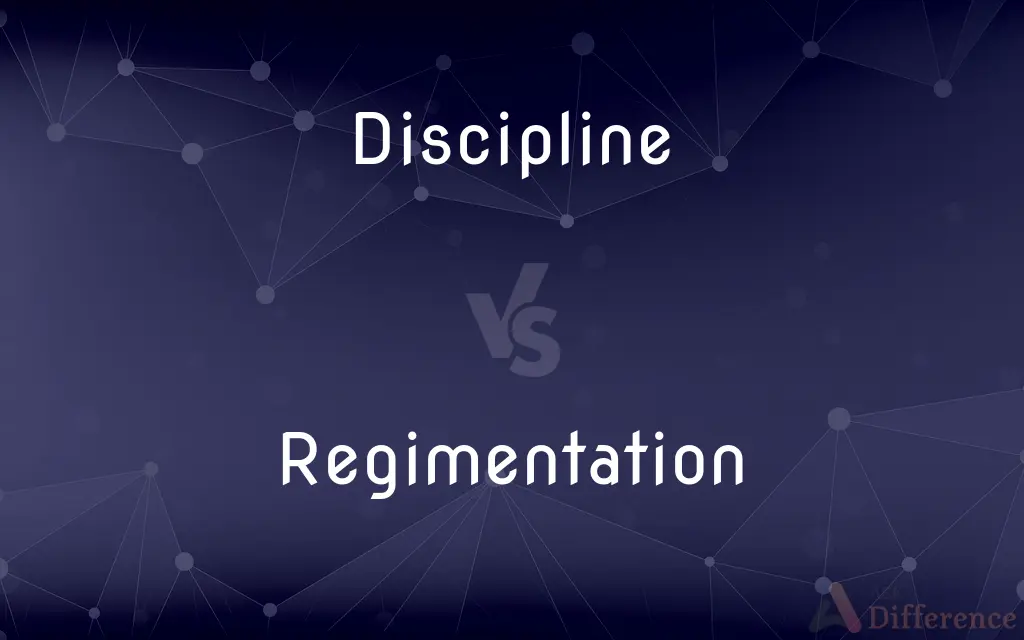Discipline vs. Regimentation — What's the Difference?
Edited by Tayyaba Rehman — By Fiza Rafique — Updated on March 30, 2024
Discipline involves self-control and training for improvement, while regimentation refers to strict control over individuals' actions within a group.

Difference Between Discipline and Regimentation
Table of Contents
ADVERTISEMENT
Key Differences
Discipline is the practice of training oneself or others to follow a code of behavior or rules, emphasizing personal growth and self-control. It's about instilling habits that foster improvement and development. On the other hand, regimentation is a form of organization where activities and personal conduct are strictly controlled, often to maintain order and uniformity within a group, such as in military contexts. It focuses less on personal growth and more on adherence to a collective standard.
Discipline can be self-imposed or externally applied, aiming at fostering responsibility and self-improvement. It is flexible to the individual’s needs and growth pace, allowing for personal development. Whereas regimentation imposes a rigid structure, leaving little room for individual variation. The primary aim is to ensure uniform behavior and conformity to a predetermined set of standards.
In educational settings, discipline helps students develop time management, focus, and perseverance, preparing them for personal and professional challenges. It encourages self-regulation and critical thinking. On the other hand, regimentation in such settings might focus on strict adherence to rules and schedules, potentially stifling creativity and individual learning styles in favor of uniformity.
Discipline, being more about self-control and internal motivation, fosters a sense of autonomy and empowerment. Individuals learn to set and achieve their goals within the framework of discipline. Conversely, regimentation relies on external control and compliance, often prioritizing the goals of the organization or group over individual aspirations.
The effectiveness of discipline is often measured by personal growth and achievement of self-set goals. It's seen as a positive quality in individuals, leading to success and self-satisfaction. Regimentation, however, is evaluated based on the uniformity and efficiency it brings to group operations, sometimes at the expense of personal freedom and creativity.
ADVERTISEMENT
Comparison Chart
Definition
Training to act in accordance with rules; self-control.
Strict control of individuals' actions to ensure uniformity.
Focus
Personal growth, self-improvement, and autonomy.
Uniformity, conformity, and control within a group.
Application
Self-imposed or external for personal development.
Imposed by an authority to maintain order and standardization.
Flexibility
Flexible, allowing for personal goals and methods.
Rigid, with little to no allowance for individual preferences.
Outcome
Self-regulation, responsibility, and personal achievement.
Efficiency, uniformity, and adherence to collective standards.
Compare with Definitions
Discipline
Self-imposed or external training that helps individuals adhere to a set of rules or standards.
The athlete's strict discipline in training led to her winning the championship.
Regimentation
Organization into a structured and uniform format, especially in a military context.
The army's success was partly due to the regimentation of its troops.
Discipline
Personal control used to overcome obstacles and achieve goals.
His discipline in saving money allowed him to buy a house at a young age.
Regimentation
The strict control of people's behavior by making them follow a set of rules exactly.
The regimentation at the boarding school was evident in the students' precise routines.
Discipline
A system of rules governing conduct or activity.
Academic discipline requires students to complete their assignments on time.
Regimentation
A system or practice of organizing or managing people or things in a regimented manner.
The factory's regimentation of the production line significantly increased output.
Discipline
The practice of training people to obey rules using punishment to correct disobedience.
Military discipline is essential for the functioning of the armed forces.
Regimentation
Imposing uniformity and conformity among members of a group, often through strict rules.
The new manager's regimentation of the office schedule led to better efficiency but lower morale.
Discipline
A branch of knowledge, typically studied in higher education.
Sociology is a discipline that examines human social behavior.
Regimentation
The act of making something more organized and uniform, often through rigorous control.
His approach to the project involved a level of regimentation that was unfamiliar to the team.
Discipline
Discipline is action or inaction that is regulated to be in accordance (or to achieve accord) with a particular system of governance. Discipline is commonly applied to regulating human and animal behavior to its society or environment it belongs.
Regimentation
A military unit of ground troops consisting of at least two battalions, usually commanded by a colonel.
Discipline
Training expected to produce a specific character or pattern of behavior, especially training that produces moral or mental improvement
Was raised in the strictest discipline.
Regimentation
A large group of people.
Discipline
Control obtained by enforcing compliance or order
Military discipline.
Regimentation
To form (troops) into a regiment or regiments.
Discipline
Controlled behavior resulting from disciplinary training; self-control
Dieting takes a lot of discipline.
Regimentation
To put (things) into systematic order.
Discipline
A state of order based on submission to rules and authority
A teacher who demanded discipline in the classroom.
Regimentation
To subject (people) to strict control and rigid order.
Discipline
Punishment intended to correct or train
Subjected to harsh discipline.
Regimentation
The act of regimenting.
Discipline
A set of rules or methods, as those regulating the practice of a church or monastic order.
Regimentation
The imposition of order or discipline
Discipline
A branch of knowledge or teaching
The discipline of mathematics.
Discipline
To train by instruction and practice, as in following rules or developing self-control
The sergeant disciplined the recruits to become soldiers.
Discipline
To punish in order to gain control or enforce obedience.
Discipline
To impose order on
Needed to discipline their study habits.
Discipline
A controlled behaviour; self-control.
Discipline
An enforced compliance or control.
Discipline
A systematic method of obtaining obedience.
Discipline
A state of order based on submission to authority.
Discipline
A set of rules regulating behaviour.
Discipline
A punishment to train or maintain control.
Discipline
A specific branch of knowledge or learning.
Discipline
A category in which a certain art, sport or other activity belongs.
Discipline
(transitive) To train someone by instruction and practice.
Discipline
(transitive) To teach someone to obey authority.
Discipline
(transitive) To punish someone in order to (re)gain control.
Discipline
(transitive) To impose order on someone.
Discipline
The treatment suited to a disciple or learner; education; development of the faculties by instruction and exercise; training, whether physical, mental, or moral.
Wife and children are a kind of discipline of humanity.
Discipline aims at the removal of bad habits and the substitution of good ones, especially those of order, regularity, and obedience.
Discipline
Training to act in accordance with established rules; accustoming to systematic and regular action; drill.
Their wildness lose, and, quitting nature's part,Obey the rules and discipline of art.
Discipline
Subjection to rule; submissiveness to order and control; habit of obedience.
The most perfect, who have their passions in the best discipline, are yet obliged to be constantly on their guard.
Discipline
Severe training, corrective of faults; instruction by means of misfortune, suffering, punishment, etc.
A sharp discipline of half a century had sufficed to educate us.
Discipline
Correction; chastisement; punishment inflicted by way of correction and training.
Giving her the discipline of the strap.
Discipline
The subject matter of instruction; a branch of knowledge.
Discipline
The enforcement of methods of correction against one guilty of ecclesiastical offenses; reformatory or penal action toward a church member.
Discipline
Self-inflicted and voluntary corporal punishment, as penance, or otherwise; specifically, a penitential scourge.
Discipline
A system of essential rules and duties; as, the Romish or Anglican discipline.
Discipline
To educate; to develop by instruction and exercise; to train.
Discipline
To accustom to regular and systematic action; to bring under control so as to act systematically; to train to act together under orders; to teach subordination to; to form a habit of obedience in; to drill.
Ill armed, and worse disciplined.
His mind . . . imperfectly disciplined by nature.
Discipline
To improve by corrective and penal methods; to chastise; to correct.
Has he disciplined Aufidius soundly?
Discipline
To inflict ecclesiastical censures and penalties upon.
Discipline
A branch of knowledge;
In what discipline is his doctorate?
Teachers should be well trained in their subject
Anthropology is the study of human beings
Discipline
A system of rules of conduct or method of practice;
He quickly learned the discipline of prison routine
For such a plan to work requires discipline
Discipline
The trait of being well behaved;
He insisted on discipline among the troops
Discipline
Training to improve strength or self-control
Discipline
The act of punishing;
The offenders deserved the harsh discipline they received
Discipline
Train by instruction and practice; especially to teach self-control;
Parents must discipline their children
Is this dog trained?
Discipline
Punish in order to gain control or enforce obedience;
The teacher disciplined the pupils rather frequently
Common Curiosities
Can discipline be considered a form of personal freedom?
Yes, discipline fosters personal freedom through self-control and internal motivation, unlike regimentation, which relies on external control.
What is regimentation?
Regimentation refers to the strict control and organization of individuals' actions and behaviors to ensure uniformity and conformity within a group.
How does discipline contribute to personal growth?
Discipline contributes to personal growth by fostering responsibility, self-regulation, and the ability to achieve personal goals.
How do discipline and regimentation differ in their application?
Discipline can be self-imposed or externally applied for personal development, whereas regimentation is imposed by an authority for uniformity and control.
Can the principles of regimentation be beneficial?
Yes, regimentation can bring benefits like efficiency and uniformity in group operations, though it may limit individual creativity.
How does regimentation affect individuality?
Regimentation often suppresses individuality by enforcing strict conformity and minimizing personal preferences and expressions.
Is there a place for regimentation in modern education?
While some level of structure is necessary, modern educational philosophies often prioritize discipline and self-directed learning over strict regimentation.
What is discipline?
Discipline is the practice of training oneself or others to follow a set of rules or behaviors, emphasizing improvement and self-control.
Is regimentation only applicable in military contexts?
While common in military contexts, regimentation can also apply in educational, workplace, and other settings where uniformity is prioritized.
Can a society function without discipline?
Discipline, in some form, is essential for the functioning of societies, ensuring order, and fostering personal and collective growth.
Do discipline and regimentation always involve punishment?
Discipline may involve corrective measures, but it's primarily about self-improvement; regimentation focuses on conformity, not necessarily using punishment.
What impact does regimentation have on creativity?
Regimentation can stifle creativity by prioritizing uniformity and adherence to strict rules over individual expression and innovation.
How can an organization balance discipline and regimentation?
Balancing involves fostering a culture of personal growth and responsibility (discipline) while maintaining necessary standards and efficiency (regimentation).
Can discipline be negative?
While discipline is generally viewed positively, excessive or improperly applied discipline can be detrimental, leading to stress or rebellion.
Share Your Discovery

Previous Comparison
Niece vs. Nephew
Next Comparison
Rope vs. StringAuthor Spotlight
Written by
Fiza RafiqueFiza Rafique is a skilled content writer at AskDifference.com, where she meticulously refines and enhances written pieces. Drawing from her vast editorial expertise, Fiza ensures clarity, accuracy, and precision in every article. Passionate about language, she continually seeks to elevate the quality of content for readers worldwide.
Edited by
Tayyaba RehmanTayyaba Rehman is a distinguished writer, currently serving as a primary contributor to askdifference.com. As a researcher in semantics and etymology, Tayyaba's passion for the complexity of languages and their distinctions has found a perfect home on the platform. Tayyaba delves into the intricacies of language, distinguishing between commonly confused words and phrases, thereby providing clarity for readers worldwide.
















































